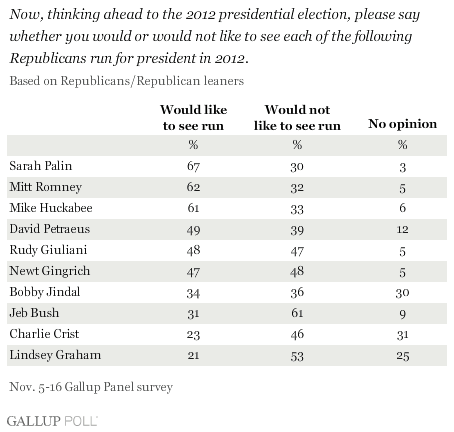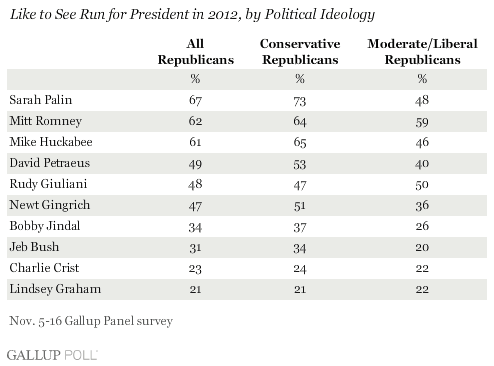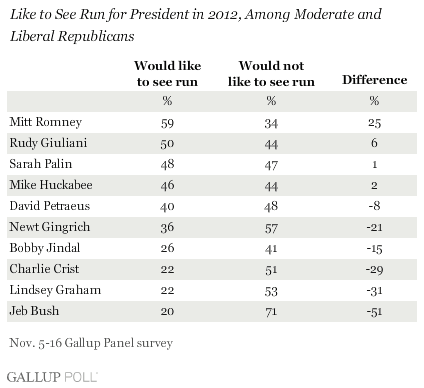PRINCETON, NJ -- Republicans and Republican-leaning independents are most interested in seeing Sarah Palin, Mitt Romney, and Mike Huckabee run for the party's presidential nomination in 2012. Those three received the highest scores among the 10 possible candidates evaluated in a recent Gallup Panel survey.

The Nov. 5-16 survey asked a nationally representative sample of Gallup panelists who identify themselves as Republicans or are political independents but "lean" to the Republican Party to say whether they "would or would not like to see" each of 10 Republicans "run for president in 2012."
Palin, Romney, and Huckabee -- all of whom raised their national profiles during the 2008 campaign -- top the list. Romney and Huckabee unsuccessfully sought the presidential nomination versus John McCain, and McCain tapped Palin as his vice-presidential running mate.
But not all 2008 GOP national candidates rated as highly in the survey. Republicans are evenly divided as to whether Rudy Giuliani should make another attempt at the White House. Giuliani was the early front-runner for the 2008 nomination, but performed poorly in the early primaries and caucuses before dropping out of the race.
The only other person evaluated who received a more positive than negative review is Gen. David Petraeus, head of the United States Central Command. It is unclear whether Petraeus would enter politics, but his growing acclaim owing to U.S. progress in Iraq could make him somewhat of a "dream" candidate for the GOP, similar to ruminations about Gen. Dwight Eisenhower in 1952 (who ran) and Gen. Colin Powell in 1996 (who did not).
Republicans are also evenly divided on potential candidacies from former Speaker of the House Newt Gingrich and Louisiana Gov. Bobby Jindal. Of the two, Gingrich is much better known, but the young governor was considered a potential McCain running mate and is thought to be a serious contender for national office in the future.
Republicans are decidedly unenthusiastic about possible White House bids from former Florida Gov. Jeb Bush, current Florida Gov. Charlie Crist, and South Carolina Sen. Lindsey Graham. Bush's prospects are obviously hurt by the dissatisfaction with his older brother's White House term and perhaps a lack of enthusiasm for a third member of the Bush family as president.
Crist and Graham were key McCain supporters early in the primaries, and helped him to critical primary wins in their home states. But the GOP rank-and-file apparently does not want these McCain loyalists to become presidential candidates themselves. It is unclear whether this has anything to do with their affiliation with McCain, although it should be pointed out that Republicans still regarded McCain quite positively after his election defeat.
Palin Appeals to Conservatives
Members of the 2008 Republican field each sought to establish himself as the "true conservative" candidate in an attempt to appeal to the vast majority of the party's voters. For the 2012 campaign, Palin would seem to have a slight edge over the rest of the possible candidates in establishing an early foothold among the party's base.
Seventy-three percent of Republicans who describe their political views as "conservative" would like to see Palin run in 2012, significantly more than any other candidate. Liberal and moderate Republicans, in turn, are somewhat cool to a 2012 Palin bid. This group tends to favor Romney over any of the other potential candidates.

As the table shows, conservative Republicans are in general more enthusiastic about most of the candidates seeking the White House than are moderate and liberal Republicans. In fact, of the 10 candidates tested, there are only 2 (Giuliani and Romney) for whom moderate and liberal Republicans are significantly more likely to favor than oppose a White House bid.

Survey Methods
Results for this Gallup Panel study are based on telephone interviews with 799 Republicans and Republican-leaning independents, aged 18 and older, conducted Nov. 5-16, 2008. The survey was the post-election phase of a pre-/post-election survey of approximately 2,000 Gallup Panel members.
Gallup Panel members are recruited through random selection methods. The panel is weighted so that it is demographically representative of the U.S. adult population. For results based on this sample, one can say with 95% confidence that the maximum margin of sampling error is ±4 percentage points.
In addition to sampling error, question wording and practical difficulties in conducting surveys can introduce error or bias into the findings of public opinion polls.
